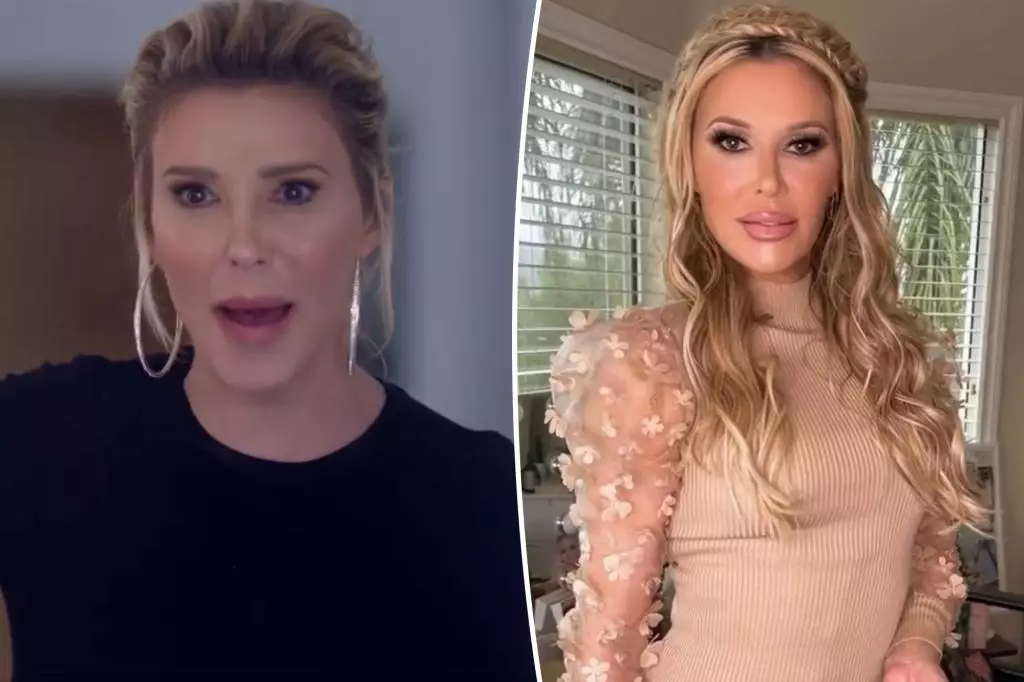Brandi Glanville, known for her outspoken personality and tumultuous journey on “The Real Housewives of Beverly Hills,” is currently at the center of a highly publicized legal battle that has taken several unexpected turns. In a stunning revelation on social media, Glanville claimed that her legal representation abruptly terminated their affiliation with her, stating she no longer had a viable case against Bravo. This announcement, made in a post that has since been removed, raises questions about the motivations behind her lawyers’ decisions and the potential implications on her allegations of sexual harassment against Bravo executive Andy Cohen.
Glanville’s claims are rife with implications of deception, as she suggested that her attorneys, who had previously assured her of a promising case, had reversed their stance without notice. Her insinuation that they may have been “paid off” reflects a deep-seated skepticism that permeates many Hollywood narratives, especially when power dynamics and financial interests are involved. Such unsettling assertions lead to further inquiries about the integrity of legal practices within the realm of entertainment.
At the heart of Glanville’s tumult lies her accusations directed at Andy Cohen, which she detailed in a letter sent to NBC and its affiliates. Allegations include inappropriate remarks and a purported advance that took place in a video sent to her in 2022. The assertion that Cohen expressed a desire to engage in sexual conduct while under the influence raises uncomfortable questions about the boundaries of professional interactions, especially considering Cohen’s position as an executive in charge of Glanville’s career.
Moreover, the claims depict a troubling scenario where power imbalances play a crucial role in shaping workplace dynamics. Glanville’s lawyers argued that Cohen’s behavior constituted a significant abuse of his authority, echoing broader conversations within the entertainment industry about the necessity of workplace reforms and the establishment of safer environments for all personnel.
Cohen’s swift response to the allegations characterized them as an inappropriate joke gone awry. He asserted that his comments were intended to be humorous and claimed that both Glanville and he understood the playful nature of the interaction. However, the dismissal of Glanville’s feelings and perceptions in favor of a comedic framework highlights the complex language of consent and boundaries in professional settings. Regardless of intent, Cohen’s actions reflect a growing concern about accountability among high-profile executives.
While Cohen’s public rebuttal does provide some insight into his perspective, it also underscores a significant aspect of the ongoing discourse surrounding harassment allegations: the difficulty in reconciling differing narratives and the inherent vulnerability of those who speak out. The power dynamics at play—in which one party possesses both public influence and corporate authority—make the act of leveling allegations both fraught and courageous.
Glanville’s accusations are emblematic of a larger backlash against long-standing issues within reality television. Following her departure from the ‘Real Housewives’ franchise, she faced renewed scrutiny regarding her behavior, including accusations from fellow cast members. Notably, Caroline Manzo’s allegations against Glanville created a narrative that further complicates the discourse around sexual harassment and consent within the very industry that ostensibly celebrates frankness and authenticity.
Also questionable are the consequences of Glanville’s experiences. As she expressed her distress about the toll that this conflict has taken on her physical and mental health, one has to wonder about the real costs of engaging in such a cutthroat industry. Her claims of stress-induced facial swelling resonate with a widespread acknowledgment of the serious mental health challenges that can arise amidst the pressures of reality television.
The controversies surrounding Brandi Glanville and the allegations against Andy Cohen illuminate the critical need for accountability and structural reform within the entertainment industry. As these events unfold, it remains imperative for both the networks and individuals involved to confront these allegations seriously and with transparency. As viewers and fans, the collective response to such narratives can create an environment that prioritizes safety and respect over entertainment, challenging the status quo of how reality television operates. The hope is that these discussions will catalyze meaningful changes that lead to healthier workplaces and empowered voices in an industry that has too often silenced them.

